腹腔镜腹股沟疝修补术
经腹腔腹膜前腹腔镜疝修补术(TAPP)和无张力疝修补术治疗成人 腹股沟疝的效果对比

经腹腔腹膜前腹腔镜疝修补术(TAPP)和无张力疝修补术治疗成人腹股沟疝的效果对比腹股沟疝是一种常见的疾病,它通常发生在腹股沟区域,是由于腹肌薄弱或者损伤造成的腹腔内的器官突出到腹股沟区域形成的疝。
而在治疗腹股沟疝的方法中,经腹腔腹膜前腹腔镜疝修补术(TAPP)和无张力疝修补术是两种常见的手术方式。
本文将对这两种手术进行效果对比,以便读者更好地了解这两种手术方式的优劣。
一、TAPP手术经腹腔腹膜前腹腔镜疝修补术(TAPP)是一种通过腹腔镜在腹腔内进行手术的方法。
TAPP手术是将腹腔镜插入腹壁内,通过摄像技术在内部观察腹腔器官和疝囊状突出物,然后修补腹股沟疝,最后将疝囊置入腹腔内。
TAPP手术具有创伤小、恢复快、并发症少等优点,因此在临床上得到了广泛的应用。
TAPP手术治疗腹股沟疝的效果非常明显,在手术后,患者的疼痛感明显减轻,疝囊也得到了有效的修补。
而且TAPP手术对于腹股沟疝的复发率也比较低,大大提高了患者的生活质量。
TAPP手术在治疗腹股沟疝方面是一种非常有效的手术方式。
二、无张力疝修补术无张力疝修补术是一种通过对腹壁进行修补,减少对腹腔内压力,减少对腹腔内器官的牵拉,提高了腹腔内压的手术方法。
该方法不使用局部张力,因此无张力疝修补术能够减少患者术后的疼痛感,并且能够减少局部组织的损伤,术后恢复更为迅速。
无张力疝修补术与传统的张力修补术相比,有着明显的优势。
通过改善局部组织的修复,减少了术后组织粘连的风险,减少了术后的疼痛感,提高了治疗的效果。
三、TAPP手术与无张力疝修补术的效果对比虽然TAPP手术和无张力疝修补术都是治疗腹股沟疝的有效手术方式,但它们各自也有着不同的优势。
就效果而言,TAPP手术是通过腹腔镜直接观察腹腔内器官和疝囊,修补疝囊,并将其置于腹腔内,术后症状缓解快,复发率低。
而无张力疝修补术是通过改善腹壁的修复,减少术后的疼痛感,提高了术后的效果。
在术后的恢复期方面,TAPP手术恢复期相对较短,术后症状得到明显改善,术后患者的生活质量也得到了提高。
腹腔镜疝修补术病例讨论
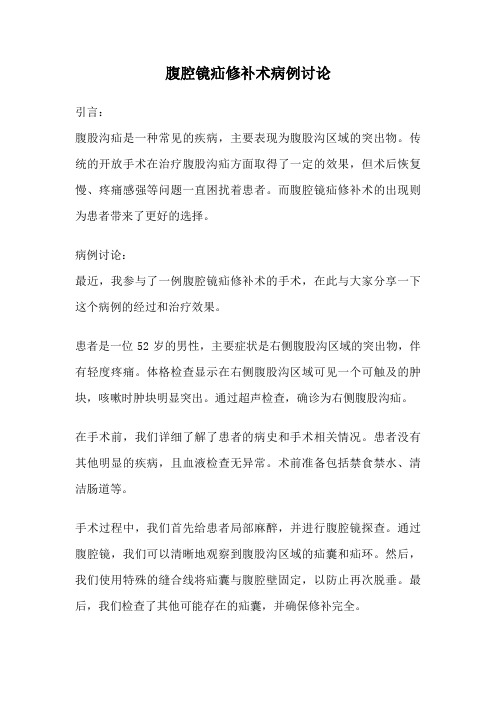
腹腔镜疝修补术病例讨论引言:腹股沟疝是一种常见的疾病,主要表现为腹股沟区域的突出物。
传统的开放手术在治疗腹股沟疝方面取得了一定的效果,但术后恢复慢、疼痛感强等问题一直困扰着患者。
而腹腔镜疝修补术的出现则为患者带来了更好的选择。
病例讨论:最近,我参与了一例腹腔镜疝修补术的手术,在此与大家分享一下这个病例的经过和治疗效果。
患者是一位52岁的男性,主要症状是右侧腹股沟区域的突出物,伴有轻度疼痛。
体格检查显示在右侧腹股沟区域可见一个可触及的肿块,咳嗽时肿块明显突出。
通过超声检查,确诊为右侧腹股沟疝。
在手术前,我们详细了解了患者的病史和手术相关情况。
患者没有其他明显的疾病,且血液检查无异常。
术前准备包括禁食禁水、清洁肠道等。
手术过程中,我们首先给患者局部麻醉,并进行腹腔镜探查。
通过腹腔镜,我们可以清晰地观察到腹股沟区域的疝囊和疝环。
然后,我们使用特殊的缝合线将疝囊与腹腔壁固定,以防止再次脱垂。
最后,我们检查了其他可能存在的疝囊,并确保修补完全。
手术进行顺利,整个过程大约持续了一个小时。
患者术后恢复良好,术后疼痛感较轻,术后第二天即可下床活动。
术后随访两个月,患者未出现复发和其他并发症。
通过这个病例,我们可以看到腹腔镜疝修补术的优势:1.微创性:相比传统的开放手术,腹腔镜疝修补术创伤更小,术后恢复更快。
2.可视性好:腹腔镜可以提供高清晰度的视野,使医生能够清晰地观察到疝囊和疝环,有利于手术的精确进行。
3.修补效果好:通过腹腔镜,可以精确地将疝囊与腹腔壁固定,减少复发的可能性。
4.并发症少:由于手术创伤小,术后并发症的发生率相对较低。
当然,腹腔镜疝修补术也存在一些局限性,如需要较高的技术要求、手术时间较长等。
但随着医学技术的不断进步,这些问题将逐渐得到解决。
结论:腹腔镜疝修补术作为一种微创手术技术,在治疗腹股沟疝方面取得了良好的效果。
通过本次病例的讨论,我们可以看到腹腔镜疝修补术的优势和潜在的应用前景。
希望通过我们的努力,能够为更多的腹股沟疝患者提供更好的治疗选择。
腹腔镜腹股沟疝修补术常规

腹腔镜腹股沟疝修补术常规腹腔镜腹股沟疝修补术常规腹腔镜腹股沟疝修补术是一种安全、技术合理的无张力修补手术。
腹腔镜腹股沟疝修补术适用于I型、II型、III型和IV型的腹股沟直疝、斜疝和股疝(中华外科学会疝与腹壁外科学组2003年8月修订稿)。
腹腔镜腹股沟疝修补术主要包括两种方法:经腹腹膜前补片植入术(TAPP), 全腹膜外补片植入术(TEP)o前瞻性研究显示腹腔镜腹股沟疝修补术复发率为1〜2%,等同于开放式无张力修补术,低于开放式有张力修补术。
前瞻性研究显示腹腔镜腹股沟疝修补术与开放式手术相比,切口小、疼痛轻、恢复正常体力活动早。
前瞻性研究显示腹腔镜腹股沟疝修补术总并发症发生率等同于开放式修补术。
腹腔镜腹股沟疝修补术最常见的并发症是血清肿。
腹腔镜腹股沟疝修补术的费用高于开放式修补术手术方法综观腹腔镜腹股沟疝修补术的发展史,可归纳为6种方法:内环口关闭术:相当于开放式手术中疝囊的高位结扎,因未对腹股沟管后壁进行修补,仅适用于小儿腹股沟斜疝。
植入物填塞术(Plug and Patch):将植入物直接植入缺损处。
因植入物容易移位,且修补局限,故复发率和再发率高,目前已很少应用,建议不要用这种方法进行腹股沟疝修补。
腹腔内补片植入术(Intra Peritoneal Onlay Mesh, IPOM):在腹腔内将补片钉合在疝缺损的腹膜上。
IP0M是目前治疗切口疝的主要方法。
在修补腹股沟疝时,因补片容易移位,需做一定的改良:如补片中央固定、补片四周缝合、打开腹膜将补片与耻骨结节或Cooper's韧带固定等。
为防止腹腔粘连,必须使用聚丙稀和聚四氟乙稀复合材料(如ComposixMesh)或膨体聚四氟乙稀(e-PTFE) 双面材料(如Dual Mesh),补片价格较贵。
IP0M+内环口成形术:在IP0M的基础上加行内环口成形术,即将腹横筋膜与骼耻束对合以缩小内环口,相当于开放式Marcy术。
该方法操作难度高,目前应用很少。
腹腔镜下腹股沟疝修补术

随着腹腔镜技术的发展,腹腔镜下腹股沟疝修补术逐渐成为主流术式。该术式具 有创伤小、恢复快、并发症少等优点,被广泛应用于临床。
腹腔镜下腹股沟疝修补术的优势
微创
腹腔镜手术采用小孔操作,避免了传统手术的大切口,减少了手术创伤和出血量,有利于 术后恢复。
视野清晰
腹腔镜下手术视野清晰,可以放大手术视野,便于医生精细操作,减少误伤周围组织的风 险。
复发预防
遵医嘱进行复发预防措施,如使用疝气带等 。
心理支持
保持积极心态,参加康复训练和支持小组, 提高自我管理能力。
生活质量评估
症状改善
评估术后疼痛、肿胀等症状是否得到改善,以及改善程度。
活动能力
评估患者术后活动能力恢复情况,如行走、站立、日常生活自理等。
心理状态
关注患者术后心理状态变化,及时发现并处理焦虑、抑郁等情绪问题。
或咳嗽等患者。
临床表现
腹股沟疝的主要症状为腹股沟区 可复性包块,站立或咳嗽时包块 突出,平卧或按压后可消失。若 发生嵌顿,可出现疼痛、恶心、
呕吐等症状。
腹腔镜下腹股沟疝修补术的发展
传统手术方法
传统的腹股沟疝修补术多采用开放手术,包括张力修补和无张力修补两种。张力 修补术因术后疼痛明显、恢复时间长等缺点已逐渐被淘汰;无张力修补术采用人 工材料进行修补,术后疼痛较轻,但存在感染、复发等并发症的风险。
异常情况,应及时就医。
活动恢复
根据医生建议,逐步恢复日 常活动。避免剧烈运动和提 重物,以免腹压增加。
饮食调整
保持饮食清淡,多吃蔬菜水 果,保持大便通畅。避免辛 辣、刺激性食物。
随访管理
定期随访
术后需定期到医院进行随访,以评估恢复情 况,及时发现并处理潜在问题。
腹腔镜下腹股沟疝修补术的

复发率低
腹腔镜下腹股沟疝修补术的临床效果显著,复发率较低。 长期观察表明,该手术方法能够有效地提高患者的生活质量。
06
腹腔镜下腹股沟疝修补 术的案例分享与讨论
案例一:老年患者的治疗
总结词
安全、有效的治疗方式
详细描述
腹腔镜下腹股沟疝修补术对于老年患者来说是一种安全、有效的治疗方式。相较于传统手 术方式,腹腔镜手术具有术后疼痛轻、恢复快、并发症少等优点,同时也能够减轻患者及 家属的心理负担。
腹腔镜下腹股沟疝修 补术的
汇报人: 日期:
目录
• 引言 • 腹腔镜下腹股沟疝修补术的术前准备 • 腹腔镜下腹股沟疝修补术的操作流程 • 腹腔镜下腹股沟疝修补术的术后护理 • 腹腔镜下腹股沟疝修补术的临床效果与展
望 • 腹腔镜下腹股沟疝修补术的案例分享与讨
论
01
引言
疝的概述
01
02
03
定义
疝是指体内器官或组织通 过先天或后天形成的薄弱 点,从正常位置进入邻近 或远离部位的现象。
02 03
详细描述
双侧疝是腹股沟疝中较为严重的一种类型,腹腔镜下腹股 沟疝修补术可以同时处理两侧的疝,具有高效、安全的特 点。同时,该手术方式还可以减少手术时间和住院时间, 降低患者的经济负担。
参考来源
相关文献报道
THANKS FOR WATCHING
感谢您的观看
医生的准备
医生应全面了解患者 的病史和身体状况, 以便制定最佳的手术 方案。
医生需要与患者进行 充分的沟通,以了解 其需求和期望。
医生需要熟练掌握腹 腔镜技术,以便在手 术中应对各种复杂情 况。
手术器械的准备
腹腔镜设备
包括摄像头、光源、气腹机等 。
腹腔镜下腹股沟疝修补术
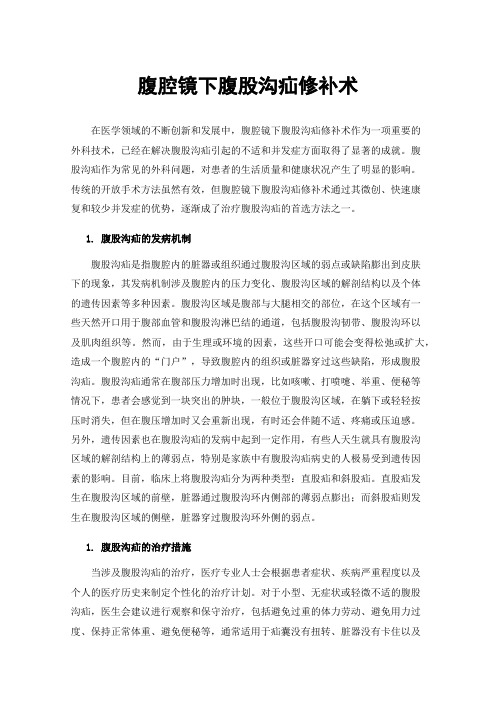
腹腔镜下腹股沟疝修补术在医学领域的不断创新和发展中,腹腔镜下腹股沟疝修补术作为一项重要的外科技术,已经在解决腹股沟疝引起的不适和并发症方面取得了显著的成就。
腹股沟疝作为常见的外科问题,对患者的生活质量和健康状况产生了明显的影响。
传统的开放手术方法虽然有效,但腹腔镜下腹股沟疝修补术通过其微创、快速康复和较少并发症的优势,逐渐成了治疗腹股沟疝的首选方法之一。
1.腹股沟疝的发病机制腹股沟疝是指腹腔内的脏器或组织通过腹股沟区域的弱点或缺陷膨出到皮肤下的现象,其发病机制涉及腹腔内的压力变化、腹股沟区域的解剖结构以及个体的遗传因素等多种因素。
腹股沟区域是腹部与大腿相交的部位,在这个区域有一些天然开口用于腹部血管和腹股沟淋巴结的通道,包括腹股沟韧带、腹股沟环以及肌肉组织等。
然而,由于生理或环境的因素,这些开口可能会变得松弛或扩大,造成一个腹腔内的“门户”,导致腹腔内的组织或脏器穿过这些缺陷,形成腹股沟疝。
腹股沟疝通常在腹部压力增加时出现,比如咳嗽、打喷嚏、举重、便秘等情况下,患者会感觉到一块突出的肿块,一般位于腹股沟区域,在躺下或轻轻按压时消失,但在腹压增加时又会重新出现,有时还会伴随不适、疼痛或压迫感。
另外,遗传因素也在腹股沟疝的发病中起到一定作用,有些人天生就具有腹股沟区域的解剖结构上的薄弱点,特别是家族中有腹股沟疝病史的人极易受到遗传因素的影响。
目前,临床上将腹股沟疝分为两种类型:直股疝和斜股疝。
直股疝发生在腹股沟区域的前壁,脏器通过腹股沟环内侧部的薄弱点膨出;而斜股疝则发生在腹股沟区域的侧壁,脏器穿过腹股沟环外侧的弱点。
1.腹股沟疝的治疗措施当涉及腹股沟疝的治疗,医疗专业人士会根据患者症状、疾病严重程度以及个人的医疗历史来制定个性化的治疗计划。
对于小型、无症状或轻微不适的腹股沟疝,医生会建议进行观察和保守治疗,包括避免过重的体力劳动、避免用力过度、保持正常体重、避免便秘等,通常适用于疝囊没有扭转、脏器没有卡住以及没有明显疼痛的情况,患者需要注意疝囊的大小变化,以及任何疼痛或不适的迹象。
经腹腔腹膜前腹腔镜疝修补术(TAPP)和无张力疝修补术治疗成人 腹股沟疝的效果对比
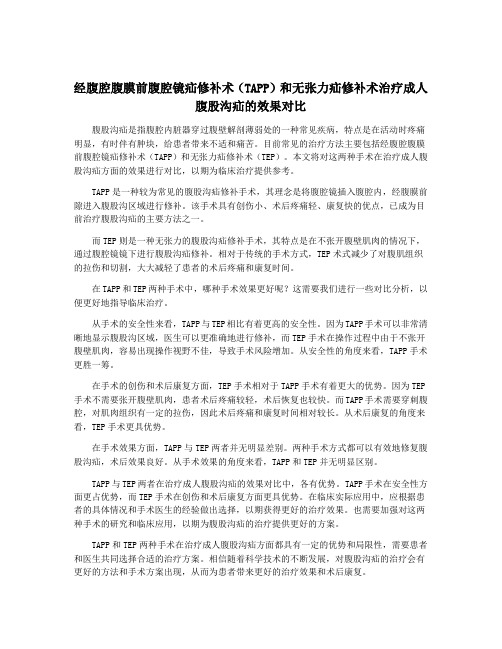
经腹腔腹膜前腹腔镜疝修补术(TAPP)和无张力疝修补术治疗成人腹股沟疝的效果对比腹股沟疝是指腹腔内脏器穿过腹壁解剖薄弱处的一种常见疾病,特点是在活动时疼痛明显,有时伴有肿块,给患者带来不适和痛苦。
目前常见的治疗方法主要包括经腹腔腹膜前腹腔镜疝修补术(TAPP)和无张力疝修补术(TEP)。
本文将对这两种手术在治疗成人腹股沟疝方面的效果进行对比,以期为临床治疗提供参考。
TAPP是一种较为常见的腹股沟疝修补手术,其理念是将腹腔镜插入腹腔内,经腹膜前隙进入腹股沟区域进行修补。
该手术具有创伤小、术后疼痛轻、康复快的优点,已成为目前治疗腹股沟疝的主要方法之一。
而TEP则是一种无张力的腹股沟疝修补手术,其特点是在不张开腹壁肌肉的情况下,通过腹腔镜镜下进行腹股沟疝修补。
相对于传统的手术方式,TEP术式减少了对腹肌组织的拉伤和切割,大大减轻了患者的术后疼痛和康复时间。
在TAPP和TEP两种手术中,哪种手术效果更好呢?这需要我们进行一些对比分析,以便更好地指导临床治疗。
从手术的安全性来看,TAPP与TEP相比有着更高的安全性。
因为TAPP手术可以非常清晰地显示腹股沟区域,医生可以更准确地进行修补,而TEP手术在操作过程中由于不张开腹壁肌肉,容易出现操作视野不佳,导致手术风险增加。
从安全性的角度来看,TAPP手术更胜一筹。
在手术的创伤和术后康复方面,TEP手术相对于TAPP手术有着更大的优势。
因为TEP 手术不需要张开腹壁肌肉,患者术后疼痛较轻,术后恢复也较快。
而TAPP手术需要穿刺腹腔,对肌肉组织有一定的拉伤,因此术后疼痛和康复时间相对较长。
从术后康复的角度来看,TEP手术更具优势。
在手术效果方面,TAPP与TEP两者并无明显差别。
两种手术方式都可以有效地修复腹股沟疝,术后效果良好。
从手术效果的角度来看,TAPP和TEP并无明显区别。
TAPP与TEP两者在治疗成人腹股沟疝的效果对比中,各有优势。
TAPP手术在安全性方面更占优势,而TEP手术在创伤和术后康复方面更具优势。
腹腔镜下行股疝修补术手术记录

腹腔镜下行股疝修补术手术记录
患者基本情况:男性,70岁,体重70公斤,身高170厘米。
手术准备:患者在手术前7天进行了全面检查,包括血液、尿液、心电图等,结果均正常。
手术前患者需空腹6小时,口服清液、清淡饮食,并做好皮肤消毒等准备工作。
麻醉方式:采用全身麻醉,对患者进行了麻醉深度检测,并进行了气管插管。
手术过程:在手术开始前,患者被放置在仰卧位,并进行了腹腔镜检查。
随后,医生对右侧股疝进行了修补。
医生在右侧腹部进行了3个小切口,分别用于放置腹腔镜、扩张器和手术器械。
随后,医生使用腹腔镜检查股疝的位置和大小,并清除了大网膜。
接着,医生使用特殊的器械将腹腔内的股疝复位,并在股疝口处缝合网片,以加强腹股沟处的支撑力。
最后,医生将扩张器和手术器械取出,缝合小切口。
手术后护理:手术后,患者被转移到恢复室,医生对其进行了密切监测,并进行了必要的止痛治疗。
患者在恢复室停留了2个小时后,被转移到普通病房。
术后第2天,患者能够下床活动,并在医生的指导下进行了适当的康复锻炼。
术后第4天,患者的伤口愈合良好,可以出院。
总结:腹腔镜下行股疝修补术是一种安全、有效的手术方法,具有创伤小、恢复快等优点。
在手术过程中,医生需要精细操作,确保手术的成功率和患者的安全。
在术后,患者需要进行适当的康复锻炼,以加快伤口愈合和恢复身体功能。
腹腔镜疝修补术与开放式无张力疝修补术治疗成人腹股沟疝的效果对比
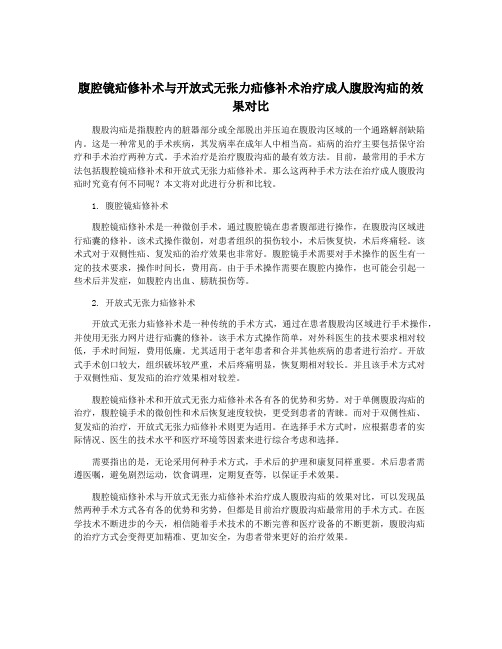
腹腔镜疝修补术与开放式无张力疝修补术治疗成人腹股沟疝的效果对比腹股沟疝是指腹腔内的脏器部分或全部脱出并压迫在腹股沟区域的一个通路解剖缺陷内。
这是一种常见的手术疾病,其发病率在成年人中相当高。
疝病的治疗主要包括保守治疗和手术治疗两种方式。
手术治疗是治疗腹股沟疝的最有效方法。
目前,最常用的手术方法包括腹腔镜疝修补术和开放式无张力疝修补术。
那么这两种手术方法在治疗成人腹股沟疝时究竟有何不同呢?本文将对此进行分析和比较。
1. 腹腔镜疝修补术腹腔镜疝修补术是一种微创手术,通过腹腔镜在患者腹部进行操作,在腹股沟区域进行疝囊的修补。
该术式操作微创,对患者组织的损伤较小,术后恢复快,术后疼痛轻。
该术式对于双侧性疝、复发疝的治疗效果也非常好。
腹腔镜手术需要对手术操作的医生有一定的技术要求,操作时间长,费用高。
由于手术操作需要在腹腔内操作,也可能会引起一些术后并发症,如腹腔内出血、膀胱损伤等。
2. 开放式无张力疝修补术开放式无张力疝修补术是一种传统的手术方式,通过在患者腹股沟区域进行手术操作,并使用无张力网片进行疝囊的修补。
该手术方式操作简单,对外科医生的技术要求相对较低,手术时间短,费用低廉。
尤其适用于老年患者和合并其他疾病的患者进行治疗。
开放式手术创口较大,组织破坏较严重,术后疼痛明显,恢复期相对较长。
并且该手术方式对于双侧性疝、复发疝的治疗效果相对较差。
腹腔镜疝修补术和开放式无张力疝修补术各有各的优势和劣势。
对于单侧腹股沟疝的治疗,腹腔镜手术的微创性和术后恢复速度较快,更受到患者的青睐。
而对于双侧性疝、复发疝的治疗,开放式无张力疝修补术则更为适用。
在选择手术方式时,应根据患者的实际情况、医生的技术水平和医疗环境等因素来进行综合考虑和选择。
需要指出的是,无论采用何种手术方式,手术后的护理和康复同样重要。
术后患者需遵医嘱,避免剧烈运动,饮食调理,定期复查等,以保证手术效果。
腹腔镜疝修补术与开放式无张力疝修补术治疗成人腹股沟疝的效果对比,可以发现虽然两种手术方式各有各的优势和劣势,但都是目前治疗腹股沟疝最常用的手术方式。
腹腔镜腹股沟疝修补术的优点,及术前、术后注意事项

腹腔镜腹股沟疝修补术的优点,及术前、术后注意事项在外科中腹腔镜腹股沟疝修补术是一种技术合理、安全的无张力修补手术,主要是在腹壁打洞置入观察镜,利用长器械分离疝囊,然后植入补片,一般包括经腹腹膜前补片植入术和全腹膜外补片植入术,前者需要进入腹腔切开腹膜分离疝囊,后者则不需进入腹腔,是在腹膜前分离疝囊。
一般情况下,腹腔镜腹股沟疝修补术的复发率是比较低的,为1%-2%,相当于开放式无张力修补手术。
一、腹腔镜腹股沟疝修补术的优点一、术后疼痛感属于轻微程度。
患者采用传统开放手术后有着非常明显的疼痛感,一般在术后的三天内会通过注射止痛药降低疼痛感,在术后一周左右仍然存在疼痛感。
而患者采用腹腔镜手术后几乎没有疼痛感,在术后也不需要利用止痛药。
二是:术后恢复比较快。
传统开放手术后患者一般需要住院一周左右的时间才可以出院,并在两周左右的时间才可以恢复基本活动。
而腹腔镜手术的患者一般2-3天的时间就可以出院,并在出院后就可以恢复基本活动,大大缩短恢复时间。
三是:切口小,美观。
传统开放手术需要在腹股沟区切一个大概7-8cm长的切口。
而腹腔镜手术则需要在腹壁上切三个0.5-1.0cm的小切口,不会留下很大的疤痕。
四是:术后的应激反应比较小:由于传统开放手术后疼痛感比较大,非常容易刺激患者,进而增加心肺器官的负担。
而腹腔镜收手术的疼痛感比较小,患者的反应比较小,不会出现很大波动。
另外,就是腹腔镜手术可以同时处理腹股沟疝和其他疾病,如:阑尾炎、胆囊结石等,针对双侧腹股沟疝不需要额外增加切口,可以起到事半功倍的效果。
并且在治疗复发疝时可以避免原来的手术切口,使得手术更加简单。
二、腹腔镜腹股沟疝修补术的术前注意事项首先:应该进行做好术前相关检查,不仅包括血常规、电解质、心电图、肝肾功能、出凝血功能、胸片等常规检查,还需要特别注意高龄患者、慢性疾病患者的中重要脏器功能,必要时应该进行心彩超、肺功能、肺部CT、24小时动态心电图、动脉血气分析等检查。
腹腔镜疝修补术病例讨论

腹腔镜疝修补术病例讨论介绍腹腔镜疝修补术是一种用于治疗腹股沟疝的微创手术技术。
本文将讨论一个腹腔镜疝修补术的病例,探讨该手术的适应症、操作步骤、并发症以及术后护理等方面的内容。
病例描述病例:男性,65岁。
主诉右侧腹股沟可触及包块,有时伴有轻微疼痛,持续数月。
病史患者无明显疝气引起的症状,但包块逐渐增大。
检查与诊断1.体格检查:发现右侧腹股沟可触及一个可复性包块。
2.影像学检查:腹股沟CT扫描显示右侧腹股沟区域有明显的腹股沟疝。
腹腔镜疝修补术操作步骤术前准备1.患者禁食。
2.术前洗肤以保持手术区域清洁。
麻醉与定位1.术前评估患者的麻醉适应症。
2.给予全身麻醉。
手术步骤1.在腹腔中插入第一个工作孔。
2.腹腔镜引入,进行腹腔腹膜解剖。
3.通过第二个工作孔将腹腔镜辅助器械引入腹腔。
4.找到疝囊并将其修复。
5.固定伤口,关闭腹腔。
术后护理1.监测患者生命体征,确保术后恢复正常。
2.给予镇痛药物以缓解术后疼痛。
3.定期更换伤口敷料,观察伤口愈合情况。
4.术后2周后进行复查,评估手术效果。
术后并发症与处理1.术后感染:给予抗生素治疗。
2.出血:严密监测出血情况,如有需要进行止血处理。
3.伤口疝:及时进行处理,可能需要进行再次手术。
结论腹腔镜疝修补术是治疗腹股沟疝的有效方法。
通过本病例的讨论,我们了解了腹腔镜疝修补术的操作步骤、术后护理和并发症处理等内容。
对于临床医师来说,掌握腹腔镜疝修补术的技术和注意事项对于患者的治疗和康复具有重要意义。
腹腔镜疝修补术与开放式无张力疝修补术治疗成人腹股沟疝的效果对比
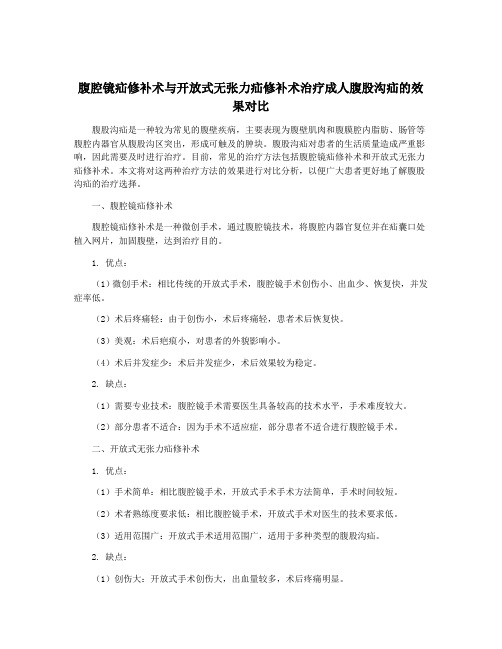
腹腔镜疝修补术与开放式无张力疝修补术治疗成人腹股沟疝的效果对比腹股沟疝是一种较为常见的腹壁疾病,主要表现为腹壁肌肉和腹膜腔内脂肪、肠管等腹腔内器官从腹股沟区突出,形成可触及的肿块。
腹股沟疝对患者的生活质量造成严重影响,因此需要及时进行治疗。
目前,常见的治疗方法包括腹腔镜疝修补术和开放式无张力疝修补术。
本文将对这两种治疗方法的效果进行对比分析,以便广大患者更好地了解腹股沟疝的治疗选择。
一、腹腔镜疝修补术腹腔镜疝修补术是一种微创手术,通过腹腔镜技术,将腹腔内器官复位并在疝囊口处植入网片,加固腹壁,达到治疗目的。
1. 优点:(1)微创手术:相比传统的开放式手术,腹腔镜手术创伤小、出血少、恢复快,并发症率低。
(2)术后疼痛轻:由于创伤小,术后疼痛轻,患者术后恢复快。
(3)美观:术后疤痕小,对患者的外貌影响小。
(4)术后并发症少:术后并发症少,术后效果较为稳定。
2. 缺点:(1)需要专业技术:腹腔镜手术需要医生具备较高的技术水平,手术难度较大。
(2)部分患者不适合:因为手术不适应症,部分患者不适合进行腹腔镜手术。
二、开放式无张力疝修补术1. 优点:(1)手术简单:相比腹腔镜手术,开放式手术手术方法简单,手术时间较短。
(2)术者熟练度要求低:相比腹腔镜手术,开放式手术对医生的技术要求低。
(3)适用范围广:开放式手术适用范围广,适用于多种类型的腹股沟疝。
2. 缺点:(1)创伤大:开放式手术创伤大,出血量较多,术后疼痛明显。
(2)恢复周期长:创伤大,术后恢复周期相对较长,对患者的身体负担较大。
(3)术后疤痕明显:开放式手术术后疤痕较明显,对患者的外貌影响大。
对比分析从上述介绍可以看出,腹腔镜疝修补术和开放式无张力疝修补术各有优劣。
腹腔镜疝修补术是一种微创手术,创伤小、恢复快,适合大部分患者,但需要医生具备较高的技术水平。
而开放式无张力疝修补术手术方法简单,适用范围广,但创伤大、恢复周期长,术后疤痕明显。
根据目前的临床研究,腹腔镜疝修补术相比开放式无张力疝修补术具有更多的优势。
腹腔镜腹股沟疝修补术

汇报人:XX
• 腹股沟疝概述 • 腹腔镜腹股沟疝修补术原理及优势 • 术前准备与评估 • 手术步骤与技巧 • 术后管理与并发症防治 • 康复指导与随访计划
01
腹股沟疝概述
定义与分类
腹股沟疝定义
腹股沟疝是指腹腔内脏器通过腹 股沟区的缺损向体表突出所形成 的包块,俗称“疝气”。
发生率降低。
复发率低
腹腔镜手术能够更彻底 地处理疝囊和修补缺损
,从而降低复发率。
适应症与禁忌症
适应症
适用于各种类型的腹股沟疝,包括直疝、斜疝和股疝等。
禁忌症
严重心肺功能不全、凝血功能障碍、腹腔内广泛粘连等患者 不宜进行腹腔镜手术。
03
术前准备与评估
患者教育与心理支持
术前宣教
向患者详细解释腹腔镜腹股沟疝修补术的目的、方法、预期效果及可能的风险, 确保患者充分理解并同意手术。
康复指导与随访计划 康复指导与随访计划
• 饮食禁忌:患者应避免进食辛辣、油腻、生冷等刺激性食 物,以及容易引起腹胀的食物,如豆类、碳酸饮料等。
康复指导与随访计划 康复指导与随访计划
术后早期活动
术后患者应尽早下床活动,促进肠道蠕 动和血液循环,预防深静脉血栓的形成 。
VS
适度锻炼
随着术后恢复,患者可进行适度的锻炼, 如散步、慢跑、瑜伽等,以增强身体免疫 力和促进伤口愈合。
其他并发症防治
密切关注患者术后病情变化,及时发现并处理出血、神经损伤等并 发症。
06
康复指导与随访计划
康复指导与随访计划 康复指导与随访计划
术后初期饮食
术后24小时内,患者应以流食或半流食为主,如稀饭、米汤、面条等,避免进食过硬、过热及刺激性 食物。
腹腔镜疝修补术

腹腔镜疝修补术腹腔镜疝修补术是一种目前较为常见的外科手术方法,用于治疗腹股沟疝、脐疝和其他腹腔内脏器官脱垂等腹腔疾病。
本文将从手术背景、手术原理、手术步骤、术后护理和手术效果等方面进行介绍。
首先,我们来了解一下手术的背景。
腹股沟疝是一种常见的疾病,主要表现为腹股沟区域膨隆和腹股沟疼痛。
传统的疝修补手术主要采用开放手术方法,但这种方法存在创伤大、恢复慢、并发症多等问题。
相比之下,腹腔镜疝修补术具有创伤小、恢复快、并发症少的优势,因此被广泛应用于腹股沟疝的治疗。
接下来,我们介绍一下手术的原理。
腹腔镜疝修补术是通过在腹腔内插入腹腔镜和手术器械,将疝囊复位并修补腹壁缺损。
术前,患者一般需要做好准备工作,包括禁食、解尿等。
手术中,医生通过腹腔镜的引导下,将器械插入腹腔内,找到腹股沟区域的疝囊和腹壁缺损部位,然后用特殊的网状材料进行修补。
术后,患者需要留院观察一段时间,以确保手术效果稳定。
接下来,我们来了解一下手术的步骤。
腹腔镜疝修补术一般分为三个步骤:准备工作、手术操作和术后处理。
首先是准备工作,患者需要按照医生的指导进行禁食和解尿等准备工作。
然后,患者被安放在手术床上,全麻下进行手术。
手术操作主要包括腹腔镜插入和器械操作,医生通过腹腔镜的引导下将器械插入腹腔内,进行修补操作。
最后,术后处理包括患者留院观察、注意伤口护理和术后复查等。
然后,我们来了解一下术后护理。
术后患者需要留院观察一段时间,医生会根据患者的情况制定相应的护理方案。
术后患者需要注意伤口护理,保持伤口清洁干燥,避免感染。
另外,患者还需要遵守医生嘱咐的饮食和活动限制,以促进伤口的愈合和手术效果的稳定。
最后,我们来了解一下手术的效果。
腹腔镜疝修补术相比传统的开放手术方法,具有创伤小、恢复快、并发症少的优势。
手术后患者疼痛明显减轻,腹股沟区域的突出也得到了有效的修复。
术后患者的生活质量得到了明显的改善,同时手术效果也得到了长期的稳定。
综上所述,腹腔镜疝修补术是一种针对腹股沟疝等腹腔疾病的外科手术方法,具有创伤小、恢复快、并发症少的优势。
腹腔镜疝修补术

腹腔镜疝修补术腹腔镜疝修补术是一种常见的手术方法,用于治疗腹壁疝。
什么是腹壁疝?腹壁疝是指腹腔内的组织或器官突出通过腹壁上的缺损或薄弱区域,形成一个可触及的肿块。
常见的腹壁疝包括脐疝、切口疝和腹股沟疝等。
腹壁疝的主要症状是肿块,有时会伴随疼痛或不适感。
传统的腹壁疝修补手术需要通过开腹的方式进行,需要较大的切口和较长的恢复期。
而腹腔镜疝修补术则采用腹腔镜技术进行,不需要大切口,在腹壁上进行几个小孔的切口,通过这些切口插入腹腔镜和其他手术器械进行修补。
腹腔镜疝修补术的主要步骤包括:麻醉、进行腹腔镜检查、修补腹壁缺损、固定腹网和关闭切口。
首先,病人会接受全身麻醉,然后医生会在腹壁上进行几个小孔的切口,并插入腹腔镜和其他手术器械。
通过腹腔镜可以观察到腹壁疝的情况,并进行修补。
修补方法包括使用人工网片或将腹腔内的组织复位到腹腔内。
修补完成后,医生会将腹网固定在腹壁上,以保持修补部位的稳定和强度。
最后,医生会将切口缝合关闭,并进行一些必要的皮肤处理。
与传统的开腹手术相比,腹腔镜疝修补术有多个优势。
首先,腹腔镜手术创伤小,恢复快。
由于手术切口小,术后疼痛和并发症风险较低。
其次,腹腔镜手术在修补腹壁疝的准确性和可视性方面具有优势,医生能够清楚地观察到疝囊和腹壁间的解剖结构,使得手术更加精确和安全。
此外,腹腔镜手术还可以同时修补多个疝,减少患者的手术次数和不便。
然而,腹腔镜疝修补术也有一些风险和限制。
术中可能发生出血、感染、伤害脏器等并发症,但这样的并发症在经验丰富的医生手中风险较低。
此外,腹腔镜疝修补术并非适用于所有的腹壁疝,对于较大的、复杂的疝或合并其他病变的患者,可能需要采用传统的开腹手术进行修补。
总的来说,腹腔镜疝修补术是一种安全、有效的手术方法,广泛应用于腹壁疝的治疗。
通过腹腔镜技术,可以实现精确的修补,创伤小,恢复快,对于患者来说具有较大的优势。
但是,在进行手术前,医生需要对患者进行全面的评估和检查,从而确定最适合的手术方案。
腹腔镜腹股沟疝修补术手术记录

腹腔镜腹股沟疝修补术手术记录
腹腔镜腹股沟疝修补术是一种通过腹腔镜技术修补腹股沟疝口的微创手术。
该手术可以减少术后恢复时间和并发症的风险,因此越来越多的患者选择这种手术方式来治疗腹股沟疝。
下面是一份腹腔镜腹股沟疝修补术的手术记录。
手术时间:2021年9月30日上午9:00-12:00
手术医生:某某某
手术助手:某某某
手术前准备:
1. 将患者清空肠内内容物
2. 将患者作快速全身麻醉
3. 患者取俯卧位,双髋屈曲,并固定腿部。
4. 用碘酒消毒腹部
5. 插入低流量CO2气体,建立腹腔镜手术空间
手术程序:
1. 通过小切口插入腹腔镜和外科器械,进行腹腔检查。
2. 检查疝区并清除可能存在的粘连组织。
3. 确认疝囊大小及位置。
4. 在腹股沟区域插入修补网,仔细将其放置在疝口区域。
5. 将修补网进行细微调整,确保其正确地覆盖疝囊,并稳定拟合在腹壁上。
6. 清除可能存在的气体,关闭手术口。
7. 腹壁小切口缝合。
手术后处理:
1. 为患者注射止痛剂和抗生素。
2. 监测患者生命体征,并追踪病情变化。
3. 接受医护人员的护理和监测。
4. 随访患者,指导其术后护理和康复训练。
结论:
通过腹腔镜技术进行腹股沟疝修补术是一种有效的方法。
它能够减少手术难度、减轻病人疼痛程度,同时通过微创手术缩短术后恢复期,提高患者的生活质量。
需要医生们在手术中注意细节,确保患者安全。
最后,我们希望患者能够快速恢复,并回归健康的生活。
腹腔镜疝修补术

(LIHR)
----一种安全、技术合理的无张力修补手术。 一种安全、技术合理的无张力修补手术。
LIHR与传统疝修补术的比较
2003年 Cochrane医学网站公布了 41个 随机 对照实验的 Meta分析随访 7 161例患者 6~ 36个月结果:
患者术后疼痛、 神经感觉异常轻于 传统手术 . 恢复正常活动时间短于传统开放手 术 两者总并发症发生率相同
LIHR的方法㈠
单纯疝环缝合法: 相当于开放式手术 中疝囊的高位结扎, 因未对腹股沟管后壁 进行修补,仅适用于 小儿腹片植入术 (IPOM ):
在腹腔内将补片 钉合在疝缺损的腹膜 上,IPOM是目前治疗 切口疝的主要方法。
LIHR的方法㈢
经腹膜前补片植入术 (Transabdominal Preperitoneal, TAPP): 在腹腔内打开腹膜, 解剖腹膜前间隙,将补片 与Cooper's韧带、耻骨结 节、腹直肌外缘和联合肌 腱钉合,再关闭腹膜。
探讨较经济的完全腹膜外腹腔镜腹股沟 TEP)的可行性 疝修补术 ( TEP)的可行性
-----------为TEP的推广提供借鉴 为 的推广提供借鉴
回顾性分析湖北省宜昌市第二人民医院普通外科 2006年 月至2007年12月对23例腹股沟疝进行TEP 2006年6月至2007年12月对23例腹股沟疝进行TEP 的临床资料 结果 :23例腹股沟疝患者腹膜撕裂3例,中转开 23例腹股沟疝患者腹膜撕裂3 放手术2 中转全麻1 均发生于斜疝) ;手术时间 放手术2例,中转全麻1例(均发生于斜疝) ;手术时间 40~180 min,平均住院 5 d,住院费用 4500~5000 40~ min,平均住院 d,住院费用 4500~ 元;术后无疼痛、血清肿、感染、疝复发等并发症发 生。 结论:采用连续硬膜外麻醉,免气囊分离器, 结论:采用连续硬膜外麻醉,免气囊分离器,国产 聚丙烯补片不予钉合固定的 TEP是可行的,为其在基 TEP是可行的, 层医院的开展提供了借鉴作用。
- 1、下载文档前请自行甄别文档内容的完整性,平台不提供额外的编辑、内容补充、找答案等附加服务。
- 2、"仅部分预览"的文档,不可在线预览部分如存在完整性等问题,可反馈申请退款(可完整预览的文档不适用该条件!)。
- 3、如文档侵犯您的权益,请联系客服反馈,我们会尽快为您处理(人工客服工作时间:9:00-18:30)。
TEP手术的操作要点 KEY POINTS
1.病人的体位。Body Position 2.Trocar的放置。Port placement 3.正确的进入腹膜前间隙。Push it slowly and check on the screen that I’m going in the right way 4.腹膜前间隙的分离。Dissection with the scope 5.解剖结构的辨认。Know the working anatomy 6.疝囊剥离。Dissection of the hernia sac 7.补片的放置。(常用3D补片)Mesh placement
腹腔镜腹股沟疝修补术(LIHR) 及3D补片的应用 -- The application of LIHR and 3D mesh
南京医科大学附属南京第一医院 普外科
曹红勇 Hongyong Cao
南京医科大学附属南京第一医院
1
腹腔镜腹股沟疝修补术(LIHR)
Laparoscopic inguinal hernia repair
(1)完全腹膜外修补术(totally extraperitoneal TEP) (2)经腹腹膜前疝修补术(transabdominal preperitoneal TAPP) (3)腹膜内补片植入术疝修补术( intraperitoneal onlay mesh IPOM)
南京医科大学附属南京第一医院
皱缩率低,最少的术后异物感、慢性疼痛 组织长入性好 12天组织完全长入 生物相容性好,耐受感染能力强 更软、更柔顺
南京医科大学附属南京第一医院
通用3D补片Aspide 3D Mesh
精索血管 分叉
结构特点
1 三维立体定位补片 解剖立体结构
2 透视定位孔 提高医生手术精准率 3 左右侧兼容,便于操作
南京医科大学附属南京第一医院
LIHR手术的优点 Advantages
1.切口小,疼痛轻,美观。 Small incision — Less pain — Better outlook 2.避免了由于切口所致的组织损伤,神经损伤,切口感染。 Small wound area — Low risk of infection and tissue damage 3.局部的紧张感,异物感轻微。 Tension-free — More comfortable 4.空间大,视野清晰,解剖标志明显,补片易于放置到位,展 平。 Allowed clear visualization of all preperitoneal fascial planes and anatomic landmarks Easy to fix the mesh to planned place
Quicker recovery — a shorter hospitalization period
南京医科大学附属南京第一医院
全腹膜外腹腔镜腹股沟疝修补术 (TEP) Totally Extraperitonial
TEP 不进入腹腔,对腹腔无干扰,是LIHR的最佳术式 。 No opening of the peritoneum, hence no risk of damaging abdominal organs, TEP is the best approach among LIHR. 由于没有现成的手术空间,需要人造间隙。而且,人造 的间隙相对较小,增加了手术难度。 Since no ready operation space, better exposure of the extraperitoneal space needs adequate experience, which raises the difficulty.
南京医科大学附属南京第一医院
病人的体位 Position
-Start the insufflation of the -建立气腹: extraperitoneal space with a pressure of 帮助医生有足够空间观察操作 10-15mmHg( CO ) 2 患者通常为头低脚高位15-30° -Low head and high legs ( 15-30°) CO2维持压力10-15mmHg -Both contribute to better exposure
解剖结构的辨认 Anatomy
南京医科大学附属南京第一医院
解剖结构的辨认 Anatomy
南京医科大学附属南京第一医院
常用的3D补片
• 通用 Aspide Mesh • 巴德 Bard Mesh • 泰科 Tyco Mesh
南京医科大学附属南京第一医院
通用3D补片Aspide 3D Mesh
材料特点 Features • 聚丙烯材料经特殊工艺热压成形 A reinforcement net made of non-woven, non-knitted and non-resorbable polypropylene • 具有皱缩率低(<5%) Less shrinkage • 组织长入性好 Excellent colonization • 术后慢性疼痛发生率低 Less post-operative chronic pain
腹壁下血管Epigastric Vessels 斜疝区Indirect Space 腹股沟韧带Inguinal Ligament
腹直肌Rectus Muscle
直疝区Direct Space 耻骨结节Pubic Tubercle 股疝区Femoral Space Cooper韧带Cooper’s Ligament
------(中华外科学会疝与腹壁外科学组2003年8月修订稿)
南京医科大学附属南京第一医院
LIHR手术的禁忌证 Contra-indication
1.不能耐受麻醉和气腹者。 intolerance of anesthesia and pneumoperitoneum 2.严重出血倾向者。 serious hemorrhagic tendency 3.嵌顿疝、绞窄疝。incarcerated hernia and strangulated hernia 4.腹腔镜手术后严重粘连者。severe Postlaparoscopic operation adhesion 5.复杂滑动疝。complicated sliding hernia 6.合并妊娠者。combined with pregnancy
泰科3D补片Tyco 3D Mesh
聚酯材料
外侧缘 内侧缘
裙边
南京医科大学附属南京第一医院
南京医科大学附属南京第一医院
4 更少固定,降低术后 慢性疼痛
Cooper韧 带
规格:15*11cm,13*10cm
南京医科大学附属南京第一医院
巴德3D补片Bard 3D Mesh
材料特点 Features
1.单丝聚丙烯,与组织产生尼龙拉扣效应 Monofilament PTEE stitches minimizes the risk of ad南京第一医院
Trocar的位置 Port Position
南京医科大学附属南京第一医院
腹膜前间隙 pre-peritoneal space
南京医科大学附属南京第一医院
15
解剖结构的辨认 the working Anatomy
南京医科大学附属南京第一医院
解剖结构的辨认 Anatomy
睾丸动静脉Testicular Vessels
输精管Vas Deferens
•髂血管 Illiac Vessels
南京医科大学附属南京第一医院
解剖结构的辨认 Anatomy
南京医科大学附属南京第一医院
解剖结构的辨认 Anatomy
南京医科大学附属南京第一医院
解剖结构的辨认 Anatomy
南京医科大学附属南京第一医院
腹股沟疝的发病基础: etiology of inguinal hernia 肌耻骨孔 myopectineal orifice
南京医科大学附属南京第一医院
肌耻骨孔 myopectineal orifice
南京医科大学附属南京第一医院
腹股沟疝修补的目标—完整覆盖肌耻骨 孔
完整覆盖肌耻骨孔有三层不同的修补层次 Reconstruction of three differtent layers
巴德3D补片—结构特点:与腹股沟区拟合的三维结构
尖端外侧缘
隆起部分 与腹股沟 韧带的轴 线相一致
加强边缘
凹口与髂外血 管位置一致
内侧指示标志便于放 置定位
南京医科大学附属南京第一医院
巴德3D补片
规格:13.7*8.5cm,16*10.8cm,17.3*12.4cm 分左右
南京医科大学附属南京第一医院
2.加强边缘 reinforced edge
– 保持形状 Formed – 防止毛边 Sealed edges provide on overhang of ePTFE without compromising the polypropylene Bard mesh side.
南京医科大学附属南京第一医院
南京医科大学附属南京第一医院
LIHR手术的优点 Advantages
5.术中可探查是否有隐匿疝,并得到及时的治疗。 Find and treat mutiple unexpected and concealed hernia 6.治疗双侧疝、复合疝与复发疝具有一定的优势。 Ideally suitable for relapse hernia、bilateral hernia and complicated hernia 7.允许患者术后更早的回复非限制性活动。
南京医科大学附属南京第一医院
LIHR手术的适应证 Indication
